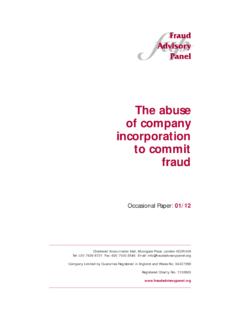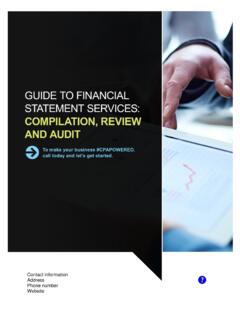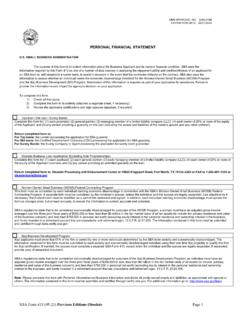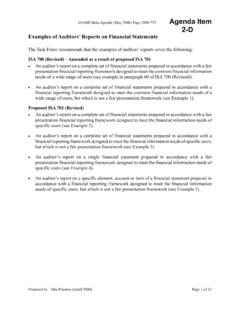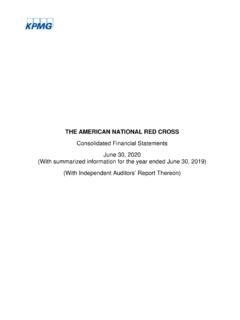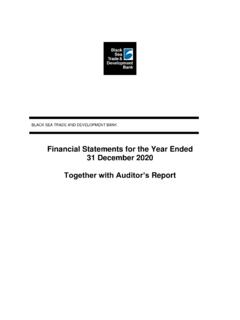Transcription of MODEL FRAUD POLICY STATEMENTS
1 Sample FRAUD POLICY STATEMENTS Disclaimer Whilst every effort has been made in the construction of these sample FRAUD POLICY STATEMENTS , compliance with them does not guarantee that you and/or your business will not be a victim of FRAUD or criminality aimed against you and/or your business. The FRAUD Advisory Panel and the contributors of these sample FRAUD POLICY STATEMENTS accept no responsibility for any action taken by parties as a result of reading these Sample POLICY STATEMENTS . Readers are strongly advised to seek and obtain the appropriate professional advice on the issues raised which affect them or their business. Acknowledgements The FRAUD Advisory Panel would like to acknowledge the valuable contributions made by members of the Education, Events & Training Working Group and other interested stakeholders in the collation of these sample FRAUD STATEMENTS . Sample FRAUD POLICY STATEMENTS February 2006 FRAUD Advisory Panel 2 OVERVIEW The objective for every organisation should be to establish an anti- FRAUD culture covering working practices and business ethics culminating in formally documented procedures.
2 A formal FRAUD POLICY statement indicates that the fight against FRAUD is endorsed and supported at the most senior level within your business. Organisations may wish to ensure all employees are aware of a zero-tolerance attitude to criminal breaches of business practices which may be reported to the police. The FRAUD POLICY statement should be communicated to all employees, contractors and suppliers. A FRAUD POLICY statement should be simple, focused and easily understood. The content may vary from business-to-business but you should consider including the business's determination to: take appropriate measures to deter FRAUD ; introduce/maintain necessary procedures to detect FRAUD ; investigate all instances of suspected FRAUD ; report all suspected FRAUD to the appropriate authorities; assist the police in the investigation and prosecution of suspected fraudsters; recover wrongfully obtained assets from fraudsters; and encourage employees to report any suspicion of FRAUD .
3 You may also wish to include the following: the allocation of responsibilities for the overall management of FRAUD ; and procedures to be followed if a FRAUD is suspected. A FRAUD POLICY statement should make clear that all employees have a responsibility for FRAUD prevention and detection. It is important the statement be actively and regularly promoted throughout the organisation to all employees, irrespective of grade, position or length of service. Sample FRAUD POLICY STATEMENTS February 2006 FRAUD Advisory Panel 3 PUBLIC SECTOR EXAMPLE ONE Introduction 1. No precise legal definition of FRAUD exists; many offences referred to as FRAUD are covered by the Theft Acts of 1968 and 1978. The term is used to describe acts such as deception, bribery, forgery, extortion, corruption, theft, conspiracy, embezzlement, misappropriation, false representation, concealment of material facts and collusion. For practical purposes, and for this manual, FRAUD may be defined as the use of deception with the intention of obtaining an advantage, avoiding an obligation or causing loss to another party.
4 2. This Chapter is concerned with occupational FRAUD FRAUD committed by XXX employees or contractors in the course of their work. Guidance on issues arising from the private and personal activities of staff which may impinge on the performance of their duties or risk bringing discredit to the XXX is contained in YYY. 3. Occupational FRAUD and abuses fall into four main categories: theft, the misappropriation or misuse of assets for personal benefit; bribery and corruption; false accounting and/or making fraudulent STATEMENTS with a view to personal gain or gain for another: for example falsely claiming overtime, travel and subsistence, sick leave or special leave (with or without pay); externally perpetrated FRAUD against an organisation. Policies & Principles 4. The XXX is committed to preventing FRAUD and corruption from occurring and to developing an anti- FRAUD culture. To achieve this the XXX will comply with the requirements of Government Accounting to: develop and maintain effective controls to prevent FRAUD ; ensure that if FRAUD occurs a vigorous and prompt investigation takes place; take appropriate disciplinary and legal action in all cases, where justified; review systems and procedures to prevent similar frauds; investigate whether there has been a failure in supervision and take appropriate disciplinary action where supervisory failures occurred; and record and report all discovered cases of FRAUD .
5 5. The following policies and principles apply in the XXX. XXX staff must have, and be seen to have, the highest standards of honesty, propriety and integrity in the exercise of their duties. The XXX will not tolerate FRAUD , impropriety or dishonesty and will investigate all instances of suspected FRAUD , impropriety, or dishonest conduct by XXX staff or external organisations (contractor or client). XXX staff must not defraud the XXX, other XXX staff, XXX clients or XXX contractors, in any way. Sample FRAUD POLICY STATEMENTS February 2006 FRAUD Advisory Panel 4 The XXX will take action including dismissal and/or criminal prosecution - against any member of staff defrauding (or attempting to defraud) the XXX, other XXX staff, XXX clients or contractors. The XXX will take action - including criminal prosecution - against external organisations defrauding (or attempting to defraud) the XXX, XXX staff in the course of their work, XXX clients or contractors.
6 The XXX will co-operate fully with an external investigating body. The XXX will always seek to recover funds lost through FRAUD . All frauds will be reported to Internal Audit. Action to be Taken in the Event of Discovery or Suspicion of FRAUD 6. The XXX has established arrangements for staff to report any concerns they may have without fear of prejudice or harassment. This applies to concerns relating to FRAUD and to any other concerns within the context of the Public Interest Disclosure Act 1998. 7. Concerns which should be reported include, but are not limited to, staff committing or attempting to commit: any dishonest or fraudulent act; forgery or alteration of documents or accounts; misappropriation of funds, supplies or other assets; impropriety in the handling or reporting of money or financial transactions; profiting from an official position; disclosure of official activities or information for advantage; accepting or seeking value from third parties by virtue of official position or duties; and theft or misuse of property, facilities or services.
7 8. External organisations actions which should be reported include: being offered a bribe or inducement by a supplier; receiving fraudulent (rather than erroneous) invoices from a supplier; reported allegations of corruption or deception by a supplier. 9. The XXX has established and maintains a FRAUD Response Plan, which sets out guidance to senior staff in the event of FRAUD being discovered or suspected. Under the Plan: incidents will be logged in a FRAUD Register, which contains details of allegations, investigations and conclusions; frauds and allegations of FRAUD will be investigated by an appointed suitably qualified senior member of staff independent of the area under suspicion; progress on investigations will be reported to ZZZ as a standing item on the agenda. Responsibilities 10. The creation of an anti- FRAUD culture underpins all work to counter FRAUD . All XXX staff should understand the risk of FRAUD faced by the office, that FRAUD is serious and diverts resources away from the XXX s primary objectives.
8 Accounting Officer& Board Member for Finance 11. The Accounting Officer and the Board Member for Finance are responsible for establishing the internal control system designed to counter the risks faced by the XXX. Together they are accountable for the adequacy and effectiveness of these arrangements. Managing FRAUD risk should be seen in the context of the management of this wider range of risks. 12. The Board Member for Finance is responsible for making arrangements for investigating allegations of FRAUD . These arrangements include the appointment of a suitably qualified senior member of staff to lead the investigation. Sample FRAUD POLICY STATEMENTS February 2006 FRAUD Advisory Panel 5 13. The Board Member for Finance will be responsible for receiving the report of the investigating officer and considering an appropriate response. The Director of Finance 14. The Director of Finance is responsible for assisting the Accounting Officer and the Board Member for Finance to develop and maintain effective controls against FRAUD .
9 The Director of Human Resources 15. The Director of Human Resources will be responsible for enforcing XXX anti- FRAUD policies, including: instigating disciplinary and legal action (both civil and criminal) against the perpetrators of FRAUD ; taking disciplinary action against supervisors where supervisory failures have contributed to the commission of FRAUD ; providing confidential advice to staff who suspect a member of staff of FRAUD . Appointed Investigator 16. The appointed senior member of staff will be responsible for investigating allegations of FRAUD including: carrying out a thorough investigation if FRAUD is suspected, with the support of Internal Audit, where necessary; gathering evidence, taking STATEMENTS and writing reports on suspected frauds; liaising with the Director of Finance and the Board Member for Finance where investigations conclude that a FRAUD has taken place; identifying any weaknesses which contributed to the FRAUD ; and if necessary, making recommendations for remedial action.
10 17. To carry out these duties the appointed member of staff will have unrestricted access to the ZZZ, the Board Member for Finance, the Management Board Member responsible for Human Resources, the Director of Finance, the Director of Human Resources, the Audit Committee, the XXX s Internal and External Auditors, and the XXX's legal advisers. Managers & Directors 18. Managers are the first line of defence against FRAUD . They should be alert to the possibility that unusual events may be symptoms of FRAUD or attempted FRAUD and that FRAUD may be highlighted as a result of management checks or be brought to attention by a third party. They are responsible for: being aware of the potential for FRAUD ; ensuring that an adequate system of internal control exists within their area of responsibility, appropriate to the risk involved and those controls are properly operated and complied with; reviewing and testing control systems to satisfy themselves the systems continue to operate effectively.
